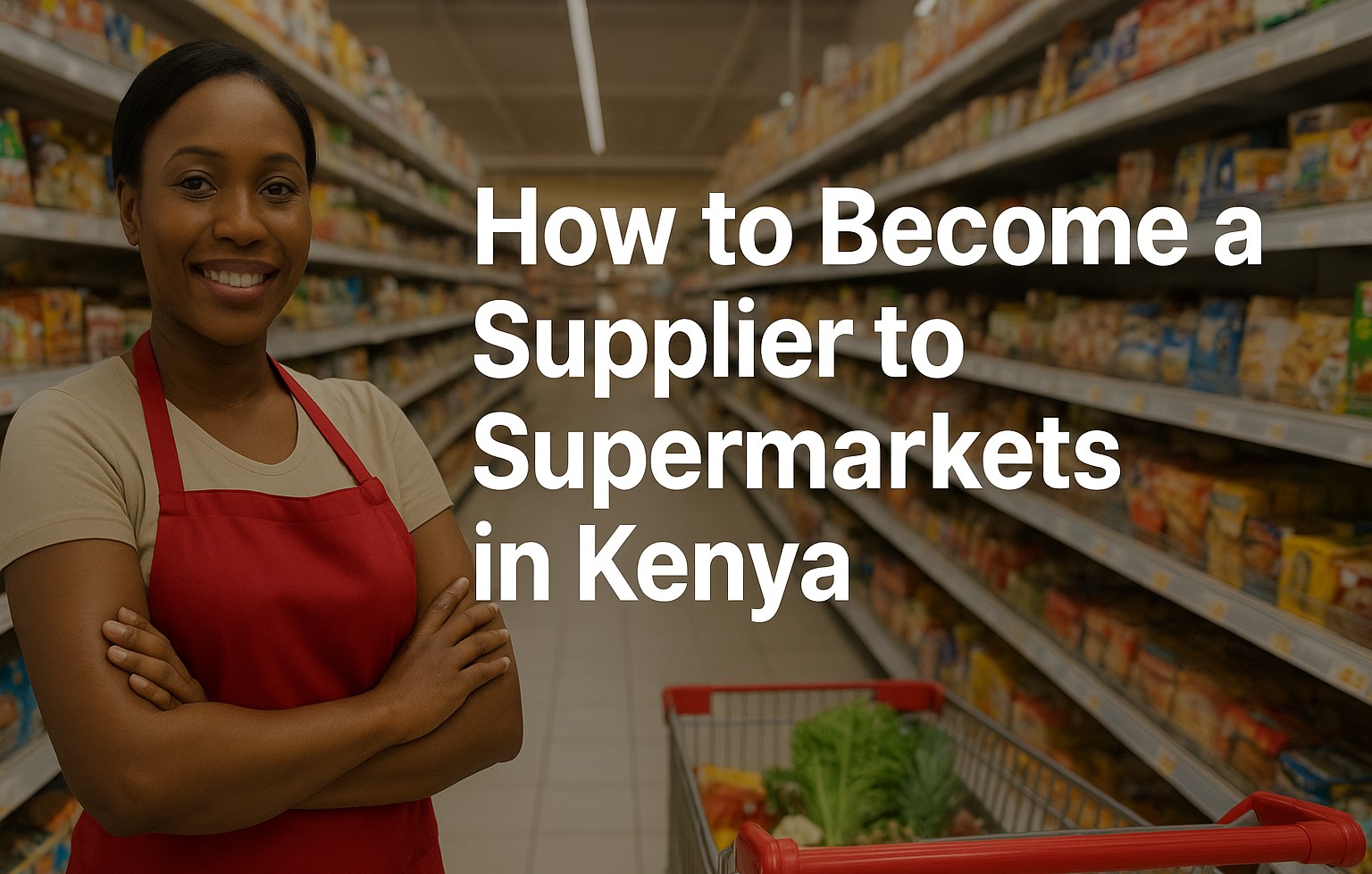

Titus Morebu
Author
How to Become a Supplier to Supermarkets in Kenya – A Step-by-Step Guide 🌟
Learn how to register, pitch, and win supply contracts with Kenyan supermarkets. Step-by-step process, tips, and legal requirements — your roadmap to success.
Why Supply to Supermarkets? 📈
Supplying goods to supermarkets in Kenya can be a stable, high-volume revenue channel. Once you’re in, you gain exposure across multiple outlets, brand recognition, and more predictable order cycles.
Overview of the Process
- Register your business and meet legal requirements
- Prepare quality-compliant products and packaging
- Research target supermarket chains and their supplier policies
- Submit supplier applications or tenders
- Negotiate terms and logistics
- Deliver and maintain performance to scale further
1. Legal & Foundational Requirements ✅
Business Registration & Tax Compliance
- Register your enterprise (sole proprietorship, partnership, or limited company) with Kenya’s Registrar of Companies.
- Obtain a KRA PIN for your business and key individuals. Register for VAT if applicable (or obtain a VAT exemption certificate). Many supermarkets require suppliers to be VAT-registered. (e.g., Uchumi’s supplier policy demands VAT registration)
- Ensure your tax compliance status is up-to-date. Supermarkets will often request current tax clearance certificates.
Standards, Certifications & Regulatory Compliance
- Comply with Kenya Bureau of Standards (KEBS) rules: ensure your product meets required quality, labeling, weights, and safety standards.
- If handling food or perishables, obtain relevant licenses from the Kenya Food and Drugs Authority (or county health authority).
- Implement proper packaging, labeling, and bar coding (UPC or EAN) so that your products integrate with retailer systems.
Capacity, Infrastructure & Quality Control
Supermarkets expect reliable supply. You should:
- Have sufficient production capacity or reliable sourcing.
- Store inventory in proper conditions (warehousing, cold chain if needed).
- Implement internal quality control measures (batch testing, inspection).
2. Know the Supermarkets & Their Supplier Policies 🏬
Major Players in Kenya
Chains such as Naivas, Quickmart, Carrefour, Tuskys (if active), and Uchumi are important targets. For example, Uchumi lists supplier criteria including product standards, packaging, labeling, capacity, and integrity. (Uchumi’s official site) Naivas also maintains a transparent supplier policy. (Naivas supplier page)
Supplier Onboarding / Listing Requirements
Each supermarket chain has a “supplier registration” or “supplier portal” where you can apply to become a vendor. Common requirements include:
- Completed supplier profile form and trade agreement
- Product catalog with product specs, photos, and price list
- Samples for evaluation
- References from other customers or retailers
- Proof of capacity to supply branches across regions
3. How to Apply & Win the Opportunity 🎯
Identify Opportunities & Timing
- Visit supermarket websites and look for “Become a Supplier” or “Suppliers” pages.
- Attend trade fairs, industry expos, and supermarket vendor fairs. These are good networking platforms.
- Monitor procurement portals such as e-procurement systems used by public institutions and supermarkets when they seek bulk supply.
Prepare a Winning Proposal
- Submit clean, professional product catalogs with good images and descriptions.
- Offer competitive prices while maintaining margins.
- Include proof of quality control, testing, lab reports, shelf life, etc.
- Provide testimonials, references, or prior buyers.
- Offer logistical solutions — how you’ll deliver reliably and quickly to multiple branches.
Negotiation & Terms
- Negotiate acceptable payment terms (e.g. 30 days, 45 days, etc.).
- Agree on minimum order quantities, delivery schedules, returns policy, wastage, etc.
- Include penalties or conditions for non-delivery or quality failure.
4. Public & Institutional Procurement as a Parallel Pathway
Some supermarkets (especially chains with government contracts or those serving institutional clients) use public procurement processes. Suppliers to public institutions must register on Kenya’s e-GP portal. From July 1, 2025, all suppliers must self-register on the national e-GP portal to participate in government tenders.
Registering on e-GP Portal
- Access the portal at egpKenya.
- Submit business registration docs, KRA PIN, directors info, capacity statements.
- Once approved, you are eligible to bid on tenders across government entities and agencies.
AGPO (Preference for SMEs, Youth, Women)
Kenya’s public procurement system includes AGPO (Access to Government Procurement Opportunities) rules, which reserve portions of tenders for SMEs, youth, and women-owned enterprises. If your business qualifies, leverage this program to gain institutional contracts.
5. Logistical & Operational Excellence
Efficient Supply Chain & Delivery
- Use reliable transport that can handle multi-branch deliveries.
- Have buffer stocks so you can meet last-minute orders.
- Map branch locations and plan delivery routes for cost efficiency.
Inventory Management & Forecasting
- Use digital inventory systems to monitor stock, reorder levels, shelf life, wastage.
- Share forecasts with your supermarket buyer — proactive replenishment builds trust.
Consistent Quality & Relationship Building
- Maintain product consistency in every delivery.
- Communicate promptly when issues arise (delays, damages, defects).
- Be responsive to retailer feedback and adjust quickly.
6. Scaling & Growth Strategies 🚀
Expand Product Lines and Variants
Once you have one product listed, cross-sell complementary products or variations (size, flavor, package). This increases your share of shelf space and strengthens your relationship with the chain.
Regional & National Reach
Prove you can serve one region first, then expand to nationwide coverage. Supermarkets prefer suppliers who can reliably service all branches.
Branding & Marketing Support
Offer to support in-store branding, promotions, sampling, or point-of-sale displays. Retailers often prefer suppliers who help drive customer demand.
Technology Integration
Use ERP, EDI, or retailer integration tools to exchange order data, invoices, and stock levels automatically. This reduces errors and builds confidence with large chains.
7. Common Challenges & How to Overcome Them
- Cash flow pressures: Payment terms might cause delays. Mitigate by negotiating shorter payment cycles or using factoring.
- Logistics & distribution costs: Transportation may eat margins. Consider partnering with logistics providers or co-loading shipments.
- Product rejection due to quality standards: Always test and maintain strict quality controls.
- Competition from established suppliers: Differentiate on niche products, better pricing, faster service, or value-add (marketing support).
- Regulatory changes or compliance risk: Stay updated with KEBS, food safety, and labeling laws.
Conclusion
Becoming a supplier to supermarkets in Kenya is not just about having a good product — it’s about fulfilling professional standards, demonstrating reliability, and building long-term relationships. Follow the steps: set up your business properly, meet regulatory and quality requirements, engage supermarkets with a strong pitch and samples, excel operationally, and then scale strategically. With discipline and consistency, your brand can grow onto supermarket shelves and into many homes across Kenya. 💡
Gallery

Related Articles
3 articles
How TitoCreations Empowers Kenyan Entrepreneurs With Smart Business Systems
Discover how TitoCreations equips Kenyan entrepreneurs with profitable business ideas and modern software systems to start, manage, and scale successful ventures.

How to Start Poultry Farming in Kenya 2026: A Complete Step-by-Step Guide to Profit
Learn how to start and run a profitable poultry farm in Kenya in 2026 with up-to-date setup, costs, management, marketing, and profit strategies.

Freelancing in Kenya: How to Start With No Experience 2026
Learn how to start freelancing in Kenya with zero experience, build marketable skills, find clients, and earn KES or dollars online in 2026.